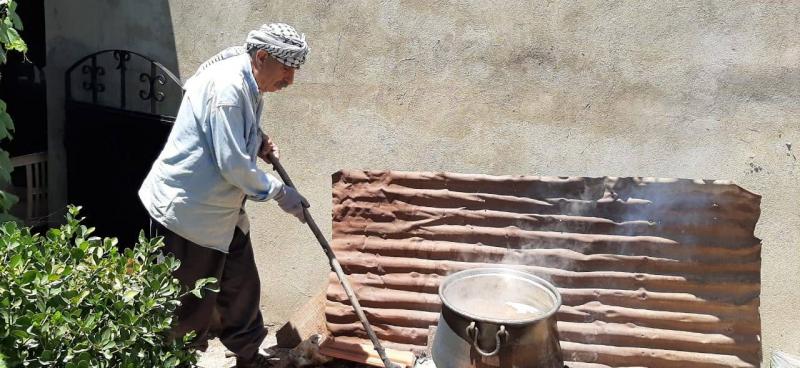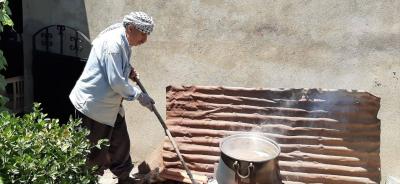Copper utensils and their accessories, which had been retired and left to gather dust on high shelves or in storage rooms, have regained their significant presence and past glory since the onset of the severe economic and living crisis in Lebanon. This revival is particularly evident this year as conditions worsen and people return to the land and its harvests.
Since the beginning of July, the practice of food preservation has opened its doors early with the onset of the production of "dibs al-hasram" (grape must syrup), entering its golden age amidst an unprecedented demand for this product, which was a domestic tradition in some villages in Rashaya, West Bekaa, and the Arqoub. With the rising price and scarcity of lemons, it has become a staple on many families' tables.
Many families now have their own preservation methods and recipes for this product, famously described as "sour like hasram." The "Star of the Morning" association in the town of Mahidtha in the Rashaya district has taken a leading role in this natural product, alongside its many other natural offerings like pomegranate molasses, jams, and various preserved foods. The association, managed by dozens of women from the town, established a special press for dibs al-hasram or its juice.
Deputy Chairwoman Wafa Jamal stated that "the manufacturing process in the association is not limited to its own production but has become a refuge for dozens of farmers and families that create this product, which has become a fundamental element on the tables of many residents in the region." The journey of harvesting hasram starts with grapevines before it becomes sweet grapes, then it is transported to the press to be crushed, juiced, filtered, and stored in large containers, and subsequently transferred to various containers from home to home—some made of antique copper, others stainless steel, or other materials.
She added: "The association's product is prepared over a low flame in modern pots specifically designed for the sour grape juice. This process takes several hours of boiling and monitoring until the acidity increases and it thickens slightly, turning red. Then it is packaged in small, sterilized glass bottles." She pointed out that "the product has a delicious taste and is a substitute for lemon, and it offers many benefits, with demand increasing particularly in recent years."
Farmer Abu Hilal Radi Maghamis, engaged in various agricultural seasons throughout the year, confirmed that "home preservation is our safe refuge, especially in this phase, which has returned agriculture to its natural state. The production of dibs al-hasram is a rural heritage mastered by those who know the taste of their mouth, as we harvest the grapes while they are still sour, and after preparing, juicing, and filtering them, we boil them over firewood—not only due to the high price of gas bottles, but because the flavor of the fire adds a unique taste that we have been accustomed to since our grandparents and fathers' days, hence the old utensils are a testament to this type of preservation, which substitutes for lemons or artificial flavors."
While noting that "the production cost is high," he added: "We bring the hasram from our vineyards, therefore saving the cost, and we gather firewood from our work and pruning of our trees, which keeps the expense limited to the bottles in which we place the product," urging to "taste it to understand its value, especially in tabbouleh and salads."
Teacher Rabi' Alama, a contractor in public education within the Rashaya district, has been making some kinds of homemade preserves for years without preservatives alongside cultivating some organic homegrown vegetables. Regarding dibs al-hasram production, he said: "The idea started a few years ago for home use due to the health and natural quality of the product and has relatively expanded after gaining trust and addressing the need for it, especially since home production has attracted many families in villages and cities for home use." He considered that "the product is old as our parents and grandparents depended on it on their tables because they weren't able to obtain lemon from the coastal cities due to the geographical distance and its scarcity in village shops."
He added: "Demand is high this season and the production method encourages selling the output, and besides being a rural heritage and tradition, it is particularly widespread in Syria, Jordan, and Lebanon, mainly in local and rural environments. Dozens of homemakers and heads of families have returned to the heritage of this ancient craft, relying on it to support their livelihoods or meet their household needs through their own efforts."
With rising temperatures and concerns over potential damage to grapevines, some grape farmers resorted to reducing the yield and harvesting grapes as hasram, especially considering the challenges of exporting grapes this year, which are compounded by the political situation affecting exports, in addition to the crisis with Saudi Arabia and Gulf countries following attempts to smuggle Captagon pills.




